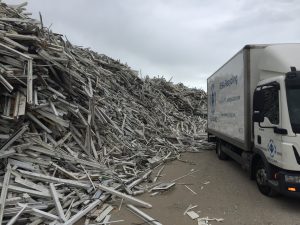Simon Scholes, managing director of VEKA Recycling, argues that with increasing demand for greener, more sustainable products, the industry should be making much more of the practical and environmental benefits of recycled PVCU.
In an age where environmental concerns are being pushed right to the top of the news agenda, as consumers, we are all far more aware of how our increasing appetite for products – and the waste that comes with them – is having a dramatic impact on the natural world around us. As a result, many of us are now doing our bit to produce less waste and reduce our carbon footprint, or at least, we are making an effort to recycle as much of our waste as we can.
Manufacturers are similarly working harder to be greener and operate more efficiently, and while some of this is of course due to regulatory pressure, the wider benefits to be had from improving factors such as factory fuel consumption, waste levels, and their carbon footprints overall are also a big incentive. The fact is that, these days, sustainability sells – something that a lot of big brands are keen to cash in on.
From hybrid and electric powered cars, to a whole raft of produce on the supermarket shelves, there is a keen demand for any product that is ‘eco-friendly’. It is frustrating then that the fenestration industry – aside from a minority of more progressive proponents – is not actively doing more to promote its green credentials, because while it may be widely regarded as simply ‘plastic’ and therefore ‘bad’, PVCU is in fact one of the most sustainable building products there is; one that can boast a potential life span of hundreds of years when broken down, processed and recycled in the right way.
PVCU can even become a better, stronger material once it is recycled, owed to the molecular structure of the plastic itself. PVCU is constructed from long strands of polymers that twist around each other during initial manufacture and are responsible for the resultant strength of the material. During the recycling process these polymer strands link together more effectively than during the initial manufacturing process and – assuming this window is being recycled alongside another of equivalent, or higher, grade PVCU – the outcome is a product that is typically more robust than its virgin profile counterpart. Current estimates are that you can successfully repeat this process up to 10 times, which considering the life span of an average window frame, could mean the material is still in use hundreds of years later.
It has to be said that this time span is an educated estimate, simply because we never get to the point where a generation of material has reached this level of degradation before better quality products are developed and brought into the mix, both literally and figuratively. For example, a new bio-PVC has recently been launched, after many years in development, which mirrors all the same properties as traditional PVCU except that it is plant based as opposed to oil based. It is still new but innovations such as this will fuel ongoing positive change, when coupled with the efforts of organisations, such as VEKA Recycling, to continue driving development of new and better ways to recycle the waste products generated by our industry.
While all recycling companies endeavour to be market leaders when it comes to this kind of development and progress, ultimately, we are all working together towards the common goal where recycling is seen as not just accepted, but expected by upcoming generations as part of the lifecycle of all PVCU products, and plastic products in general.
With this common goal in mind, a comprehensive recycling and sustainability policy should be at the core of any company operating in the glass and glazing industry.

Back to Features Next Feature